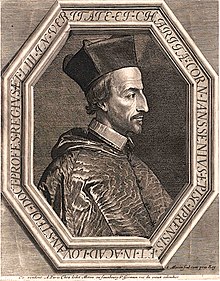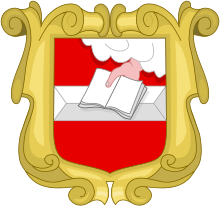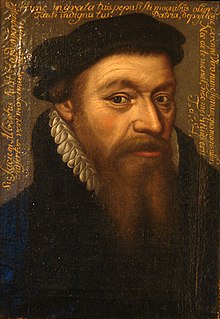Old University of Leuven


From 1425 to 1797 the old University of Leuven in Leuven was a center of culture and knowledge transfer in the southern Netherlands .
meaning
The University of Leuven also played an important role in the spread and continued use of the Latin language and literature in the Netherlands. As Jozef IJsewijn (1932–1998) said, the closure of this institution in 1797 was a disaster for latex use in the southern Netherlands.
During the seventeenth and eighteenth centuries until its closure, the university became the center of Augustinian theology in Europe, even " Jansenist Rome", with professors such as Cornelius Jansen , Peter Stockmans, Néercassel, and above all Van Espen and his famous Disciple of Justinus Febronius .
history
The old University of Louvain (1425-1797) and General Studies Lovaniense or Universitas Studiorum Lovaniensis , was designed by the French prince John of Burgundy ( John IV. , Duke of Brabant), with the approval of Pope Martin V. founded. The university was officially abolished in 1797. Its official successor was the École Centrale de Bruxelles .
The universities in Paris , Cologne and Vienna served as models for the establishment at that time . In the 16th century, Leuven was considered one of the capitals of humanism . Erasmus von Rotterdam (who was never a student or professor in Leuven) stayed in Leuven for a few months in 1517 and helped found the Collegium Trilingue . This institution for the study of Latin, Greek and Hebrew was the first institution of its kind in Europe; here, Greek and Hebrew texts were no longer studied in Latin translations, but in their original versions.
From 1493 Adrian von Utrecht was a professor here until he became Pope Hadrian VI in 1522 . was elected - the last non-Italian Pope before Pope John Paul II. Justus Lipsius taught for many years in Leuven, and Gemma Frisius looked after students such as Gerhard Mercator , Rembert Dodoens and Andreas Vesalius . Later it was the Löwen theologian Cornelius Jansen who caused an uproar with his theses and in 1783 the physicist Johannes Petrus Minckeleers discovered the suitability of coal gas for lighting purposes.
The dissolution in 1797
On October 25, 1797, under the Treaty of Campoformio, the Habsburg Dutch provinces of the Holy Roman Empire became part of the French Republic and the University of Leuven was officially dissolved. According to the law of September 15, 1793, the republic wanted to modernize the education system in France. All materials and the extensive library were transferred to the new École Centrale in Brussels . The École Centrale de Bruxelles was the official successor to the abolished old university.
literature
- 1627: Nicolaus Vernulaeus, Academia Lovaniensis. Ejus origo, incrementum, viri illustres, res gestae , Löwen, 1627.
- 1635: Valerius Andreas , Fasti academici Lovanienses , Löwen, 1635.
- 1829: Freiherr Friedrich von Reiffenberg, Mémoires sur les deux premiers siècles de l'Université de Louvain , Brussels, 1829–1835.
- 1838: Pierre De Ram, Laforêt et Namêche, Analectes pour servir à l'histoire de l'Université de Louvain , in: Annuaire de l'Université de Louvain , 1838–1865.
- 1856: F. Nève. Mémoire historique et littéraire sur le collège des Trois-langues à l'Université de Louvain , Brussels, 1856.
- 1881: E. Reusens, Documents relatifs à l'histoire de l'Université de Louvain (1425-1797) , in: Analectes pour servir à l'histoire ecclésiastique , t. XVII et seq., 1881-1892.
- 1881: Pierre De Ram, Codex veterum statutorum Academiae Lovaniensis , Brussels, 1881.
- 1884: Arthur Verhaeghen, Les cinquante dernières années de l'ancienne Université de Louvain , Liège, 1884.
- 1945: Léon van der Essen, L'université de Louvain , Brussels, 1945.
- F. Claeys Boúúaert, L'Ancienne Université de Louvain, Études et Documents , Leuven, 1956.
- 1959: F. Claeys Boúúaert, Contribution à l'histoire économique de l'Ancienne Université de Louvain , 1959.
- 1977: Claude Bruneel, Répertoire des thèses de l'Ancienne Université , Leuven, 1977.
- 1990: Emiel Lamberts et Jan Roegiers, Leuven University , 1425–1985, Leuven, University Press, 1990.
- 1990: Jan Roegiers, "Was de oude Universiteit Leuven een Rijksuniversiteit?", In Archief-en bibliotheekwezen in België , 1990, p. 545.
Personalities
See also
Individual evidence
- ^ Marc Nelissen, Leuven, Rom en Brabant . In: Nelissen, Roegiers, van Mingroot, De stichtingsbul van de Leuvense universiteit, 1425-1914 . Universitaire Pers Leuven, Löwen 2000, ISBN 90-5867-070-8 , p. 70: " de universiteit voerde het stadswapen van Leuven, een dwarsbalk van zilver op een veld van keel, maar voegde in de right bovenhoek van het schild een nimbus toe van waaruit een hand een opengeslagen boek aanreikte . "
- ^ Jozeph IJsewijn, Companion to Neo-Latin Studies, Amsterdam-New-York-Oxford, 1977, p. 102: "Latin survived as the language of the University of Louvain until the French Revolution but the abolition of this institution (1797) was a catastrophe for Latin in the Southern Netherlands "
- ↑ Leuven University , p. 31: " The university colleges were closed on November 9, 1797, and all items of use, with all the books, were requistionned fot the new École Centrale, in Brussel ". See also: Analectes pour servir à l'histoire de l'Université de Louvain , edited by PFX De Ram, Löwen, 1840, Van linthout et Vandenzande, volume 3, p. 58, nota 1: " De La Serna Santander fut spécialement chargé de faire transfers à Bruxelles les principaux ouvrages de la bibliothèque académique qui déjà, en 1794 et 1795, avait été spoliée par les commissaires français. ".

